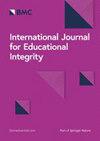培养学术诚信项目文化的线索:多维回归模型的发现
IF 6.9
Q1 EDUCATION & EDUCATIONAL RESEARCH
International Journal for Educational Integrity
Pub Date : 2024-09-09
DOI:10.1007/s40979-024-00163-6
引用次数: 0
摘要
通过多元回归法,我们确定了与商科学生自我报告的学术不端行为率相关的情境、个人和环境变量。对学术不端行为增加最有影响的预测因素是:对同学学术不端行为的估计较高、对课程学术诚信文化的负面看法越来越多,以及对有问题的学术行为的评价不那么严肃。个人优先事项、个人特征和社会支持的影响较小。然后,我们根据对更广泛背景的深刻理解对量化结果进行了分析,以便从自变量的相互作用中获得更丰富的见解。重要的是,我们的研究结果表明,以项目为主导、旨在培养学术诚信文化的主动信息传递可以有效地缓冲学术不诚信的倾向。然而,如果缺乏持续的信息传递,不断增加的学术压力可能会侵蚀这些最初的益处。此外,重大学术诚信违规行为的影响可能会持续很长时间,这表明更有必要事先培养学术诚信文化。最后,我们建议采取一种公共卫生做法,即发现积极的偏差者--在具有挑战性的环境中茁壮成长的人--然后努力将助长学术不端行为的同伴支持系统转变为阻止学术不端行为的系统,与这些人接触,了解他们抵制现状的原因和方式。本文章由计算机程序翻译,如有差异,请以英文原文为准。

Clues to fostering a program culture of academic integrity: findings from a multidimensional regression model
Using multivariate regression, we identified situational, personal and contextual variables correlated with business students’ self-reported rates of academic misconduct. The most influential predictors of increasing academic misconduct were: higher estimates of peers’ academic misconduct, increasingly negative perceptions of the program’s academic integrity culture, and rating questionable academic behaviours less seriously. Individual priorities, personal characteristics and social support were less influential. We then analyzed our quantitative results in light of our deep understanding of the broader context to derive richer insights from the interplay of our independent variables. Importantly, our results indicate that program-led proactive messaging designed to foster a culture of academic integrity can effectively buffer tendencies towards academic dishonesty. Absent ongoing messaging, however, increasing academic pressures may erode those initial benefits. Moreover, repercussions of major academic integrity breaches can be long lasting, suggesting an even greater need for fostering a culture of academic integrity a priori. Finally, we recommend a public health practice of identifying positive deviants – individuals who thrive in challenging environments – and then in an effort to change a peer support system that fosters academic misconduct into one that discourages it, engaging with those individuals to understand why and how they resist the status quo.
求助全文
通过发布文献求助,成功后即可免费获取论文全文。
去求助
来源期刊

International Journal for Educational Integrity
EDUCATION & EDUCATIONAL RESEARCH-
CiteScore
6.90
自引率
26.10%
发文量
25
审稿时长
22 weeks
 求助内容:
求助内容: 应助结果提醒方式:
应助结果提醒方式:


